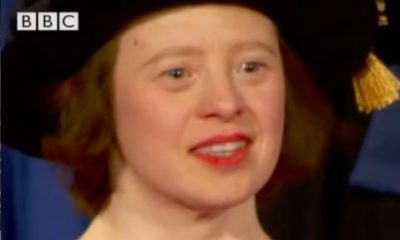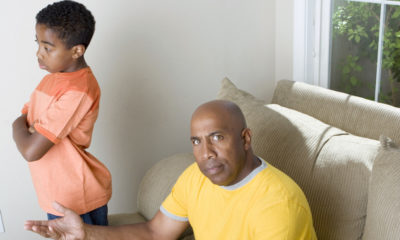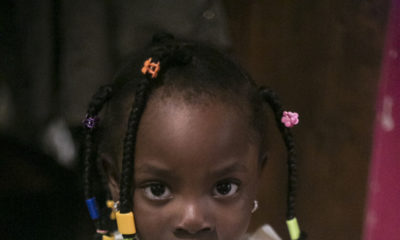Features
Love without Boundaries with Bukola Ayinde: Are Special Schools the Best Option for Special Needs Kids?
 A special school is a school for students who have special educational needs due to learning difficulties, physical disabilities or behavioural problems. In my quest to understand how our special schools work in Lagos, Nigeria, I visited both public and private special schools in Lagos State. I can boldly say that the public schools do not offer great services. This leaves us to depend on private special schools to meet the needs of children with special needs.
A special school is a school for students who have special educational needs due to learning difficulties, physical disabilities or behavioural problems. In my quest to understand how our special schools work in Lagos, Nigeria, I visited both public and private special schools in Lagos State. I can boldly say that the public schools do not offer great services. This leaves us to depend on private special schools to meet the needs of children with special needs.
On the other hand, the school fees for private special needs schools are expensive especially those located on the Island in Lagos, Nigeria.
Pacelli school for the blind is run by Catholics (Congregation of the Handmaids of the Holy Child Jesus ) and they are doing a fantastic job, despite the little resources at their disposal. Wesley school for the deaf is also located at Surulere in Lagos State. However, majority of the other public schools that accept children with neurological disabilities such as cerebral palsy, down syndrome, autism and others, do not have the funding, facility or training to handle the children.
Most of the public special schools in Lagos State focus on therapy (sometimes this is also not provided adequately) and give little concern to educating the mind. I am of the opinion that education opens the mind of children (with or without disability). No one is asking that every child must study law or receive a university degree. The most important thing in any human life is to be able to express his or her needs in any form and also have some form of independence. This should be the goal of special schools.
My daughter attended a summer school at Peto Institute in Hungary, Europe. It is a school for children with cerebral palsy. This is a school with boarding facility completely funded by the government. It has a beautiful serene environment where all children are treated with dignity. Well trained facilitators and fully equipped therapy rooms and classrooms. A lot of their equipment are made of wood and the institute has in-house carpenters who make these equipment. I strongly believe this will reduce cost too.
The entire facility was adapted to meet the children’s needs. The chairs and tables were suited for them. There were long horizontal bars by the sides of the wall that the children could hold on to. This would enable the ones that could walk with support move along the corridor of the school on their own. There were also very wide elevators to move the children from one floor of the building to another.
The restrooms were also adapted for their use. Instead of a handle for flushing the toilet, there was a rope to pull which was hanging down from the top of the restroom wall. It was easily accessible to any child who had shaky movements or unstable grip which is common with people living with cerebral palsy.
When the institute is in session, the children partake in numeracy, literacy, art, music, sports and therapy. They are also taught how to live an independent life. If a special needs school in Nigeria can achieve this, then they have done well.
Now to the big question, if a special needs school can achieve this, then why do children living with disabilities need to attend mainstream schools?
The answer is very simple. It is because there is no special world. There is no special community. There is no special place of employment (if there are, they must be very few). There is no special university and very few special secondary (high) schools.
It has been proven over and over again that when children with neurological disorder are introduced into mainstream education at an early age, and they are also given appropriate educational tools and assistance as well as continue with their therapies, drugs and treatment where applicable, they are likely do much better in adapting to the society than children who have attended special schools most of their lives.
Secondly, non-disabled children will also benefit from schooling with children living with disabilities. They will understand diversity and differences early in life. They will know how to interact with people who are different from them. It may also challenge them to be creative in their communication and approach to life. They may also come up with inventions in science and technology that will help children living with disabilities. Not to forget that while the teacher is looking for creative ways to teach the special needs children they will also discover methods to teach children who are slow in learning. Definitely it is a win- win situation.
Do you know that even children who have schizophrenia can also go to school, get jobs and grow up to have families of their own? What is required is early intervention. Where the child is using the drugs as prescribed, having psychotherapy and as well as getting an education in a mainstream school (and a special needs school where necessary) which models the right attitude.
It has also been argued that when children who have cerebral palsy and autism learn together consistently, the children with cerebral palsy tend to acquire behavioral problems similar to autism. In my experience most of the kids with cerebral palsy that I have seen with behavioral problems have been schooling with children with autism. It has been said that children with cerebral palsy imitate behaviours of the kids constantly around them.
Secondly, when children with cerebral palsy learn in the same classroom with neurotypical children (children developing normally), they are more likely to imitate good behaviour. Will this alliance affect neurotypical kids? The answer is no.
Can children with autism study in the same classroom with neurotypical children?
Yes, they can. However, it is a whole lot easier if the child with autism started therapy and schooling early and the school the child attended have trained teachers that understand his needs or the child living with autism comes to school with his own therapist or study assistant. Depending on the severity of the child’s diagnosis, the child may also require therapy after school or he may start his schooling by attending a special school fully or partially (such as two or three times a week).
Should we then rule out special needs schools? Unfortunately for many years to come in Nigeria we will not be able to achieve this.
For a child living with disability to adjust into a mainstream school then the child must have benefited from early intervention (correct diagnosis at an early age, treatment, rehabilitation plan and early education). Early intervention in disability management is still a huge problem in Nigeria.
Secondly, most of our private schools are yet to embrace inclusive education. Therefore, parents with children with disabilities find it difficult to get schools that will accept and meet the needs of their children.
Many schools in Nigeria have not trained their teachers to work with children with disability. I believe special education should become a compulsory subject for all teachers and sign language a course that they should learn. I believe this will also enrich their course curriculum.
The basis of the problem in public schools in Nigeria is the decay in the educational sector. The mainstream schools are in dire need of a total overhaul and little attention is given to disabled students.
In the meantime, I will advise parents with children with disabilities to become their children’s first teachers and of course advocates. Search out the best educational needs for your child and locate where these needs can be met.
My next point of discussion is on how to homeschool your special needs child.
Photo Credit: Dreamstime





















